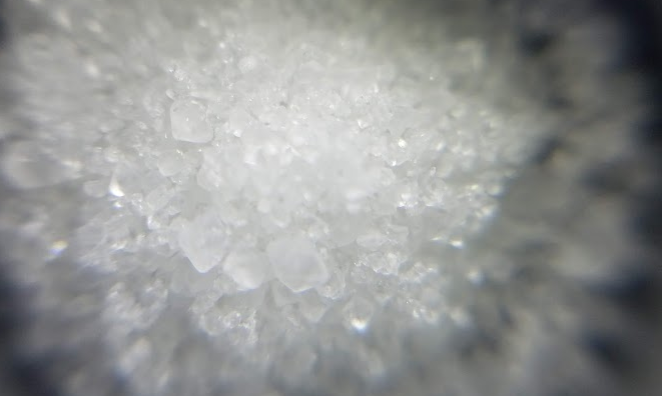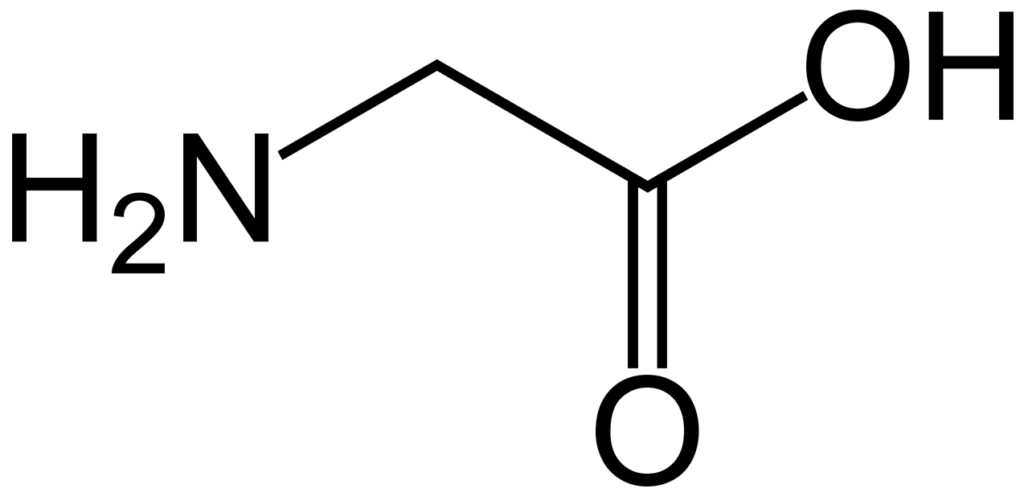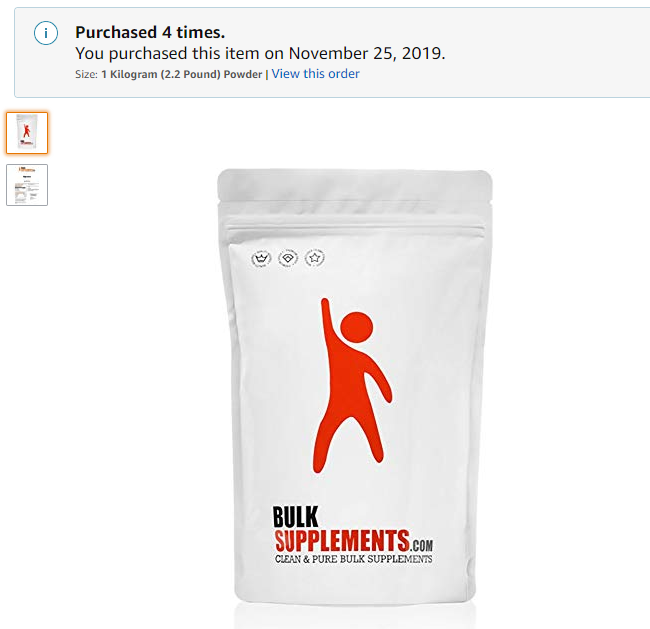When it comes to fitness and health supplements, I’m sure we can all agree who the big boys are:
Protein powders, creatine, BCAAs, multivitamins, and pre-workouts.
And while each of these supplements offer unique benefits to us, other, less-known products that can also do wonders for us.
Today, we’ll shed some light on one of these supplements. One that doesn’t receive nearly as much attention as it should – glycine.
By the end of this, you’ll know everything there is to know about the benefits of glycine and hear my own personal story about how glycine increased my own growth hormone (IGF-1).
What is Glycine?
Glycine is a conditionally essential amino acid – your body can normally cover some of its daily glycine needs, so long as you get enough protein from your diet (1). The body primarily synthesizes glycine from serine (2).
According to research, the body can synthesize about 3 grams of glycine per day, which isn’t enough to cover all metabolic costs (most notably, collagen synthesis) (3). The same researchers estimate that the human body’s ability to make glycine from other amino acids falls short by about 10 grams for a 70-kilo (154-pound) person. Meaning, we would need to get these remaining 10-12 grams through diet and supplementation.
This is important to know and act upon because glycine is quite important for the body. Not only is the amino acid is rich in collagen (which makes up about a third of its amino acid profile), but it also plays a role in many other vital processes within the body (2). Let’s take a closer look.

How Glycine Improves Sleep Quality
The importance of good sleep is undeniable because every single system and process is influenced by it in one form or another.
More specifically, sleep impacts cognitive function (memory, ability to focus, thinking skills, etc.), overall motivation to do things, energy levels, well-being, athletic performance, immune system function, hormonal levels, ability to burn fat and build muscle, blood glucose, and much more (4, 5, 6, 7, 8, 9, 10).
The list is quite long, and research still can’t figure out why we need sleep as much as we do. What we know for certain is that we do.
Now, prevailing wisdom claims that sleep duration is the most important factor. Everywhere you look, there are recommendations like, “Make sure to get seven to nine hours of sleep.” But it’s rare to see recommendations like, “Make sure to get enough restful sleep.”
But, the fact is, we need both quality and length when it comes to sleep. Six hours of restful sleep is much better than nine hours of poor sleep. What’s interesting is that glycine can help improve our sleep on a couple of fronts.
Most notably, glycine has been shown to have a calming effect within the brain and lower our core body temperature (11, 12). Both of these effects are incredibly beneficial for falling asleep more easily and sleeping through the night.
Calmness and relaxation allow you to fall asleep more easily, which is something a lot of people struggle with. Now, core body temperature is a bit more subtle, but it greatly affects your sleep quality (13). The hypothalamus regulates our core body temperature between 96.8 and 100.4 degrees F (36 to 38 degrees C). A higher temperature is associated with movement, energy, and excitability. Lower body temperature is associated with relaxation and restful sleep.
These claims are also supported by some research. In a couple of studies, people with sleep issues who took three grams of glycine before bed reported better sleep quality, reduced daytime sleepiness, and improved performance on memory-related tasks (14, 15).
From the research we have so far, it’s fair to assume that glycine is a great alternative to sleep aids like melatonin and some stronger hypnotics. So, if you were to supplement with glycine daily, it’s a good idea to leave two to three grams for right before bedtime.
Suggestion: If you are curious about how sleep impacts gains, click this link to read another article on Pump Some Iron.
In this video, John Meadows talks about the importance of sleep for recovery:
Glycine and Human Growth Hormone – What Does The Literature Say?
Growth hormone (also known as HGH) is produced in the pituitary gland and plays quite a few vital roles within the body, including:
- Regeneration and creation of tissues within the body (including the brain);
- Cell regeneration;
- Faster healing of fractures;
- Enhanced weight loss and muscle gain;
- Slower aging;
- Improved mood and cognitive function;
- Better sleep;
Once your body secretes growth hormone, it remains active within your bloodstream and allows for your liver to convert it to various growth factors such as insulin-like growth factor (IGF-1), myostatin (GDF-8), activin, and inhibin.
Now, as it turns out, glycine may play a role in growth hormone secretion. In one study, researchers gave an incredibly small dose of glycine to 31 subjects (19 normal, non-obese) and 12 with partial gastrectomy (16). They found that both groups saw an increase in serum growth hormone and concluded:
The facts demonstrated that glycine is one of the stimulatory agents inducing the pituitary gland to secrete hGH.
In a study a couple of years later, researchers intravenously infused doses of four, eight, or twelve grams of glycine in normal subjects (17). Both the four and eight-gram doses led to a significant rise in growth hormone levels, but the twelve-gram dose elicited a significantly higher growth hormone response.
Now, these two studies have certainly made some interesting suggestions…..
My Own Experience with Glycine and Growth Hormone – Lab Results
I had blood work done in April of 2018 and my growth hormone (IGF-1) came back low. The scale was 88-246 and my result was a whopping 141. I could see this was obviously pretty low and my doctor confirmed this when we went over my results. He said it was something they see if guys in their mid 30’s and we could treat it with medication.

The medication seemed promising but it was rather expensive and something my insurance wouldn’t cover. I decided to wait and deal with it later.
In the beginning of June of 2019 I was experiencing sleep issues and started researching supplements to help me fall asleep faster. My search turned up glycine. I started a deep dive into the supplement and read the studies about glycine and growth hormone. It seemed too good to be true but I decided to give it a shot.
It would be amazing if I found a supplement that would not only improve my sleep but also increase my growth hormone.
I found that Bulk Supplements sold glycine on amazon. They are a brand I was familiar with so I ordered it right away and got it on June 15th.
I started taking 20 grams of glycine every night before bed. The results it had on my ability to fall asleep and my quality of sleep was immediate. I woke up feeling more refreshed and just better after the first night.
It never seemed to stop working I continued to use it and I continued to have great sleep.
August 15th 2019 (2 months later) I had my IGF-1 tested again to see what happened…..
I was blown away by the results.
![]()
My IGF-1 had increased to 229. The scale on this one was 83-233. I’m not sure why the scale was different because I used the same lab (labcorp).
In the year+ between the first test and 2nd test, not much changed in my life. My diet and routine pretty much stayed the same. The only thing I can relate to the significant increase in IGF-1 is the glycine.

Glycine and Muscle Growth
Now, here is where things get even more interesting. It appears that this seemingly insignificant amino acid may play a big role in muscle growth. There are several possible mechanisms as to why that is.
First, it appears that glycine may play a direct role in muscle protein synthesis and growth through various metabolic pathways. In one study, researchers sought to figure out some of the mechanisms behind these claims (18).
Sun K et al. concluded that glycine regulates protein turnover (the breakdown of old proteins and their subsequent replacement) by activating protein kinase B (which itself plays important roles in glucose metabolism and cell growth). The researchers of the study also suggested that glycine plays an important role in inhibiting protein degradation by interfering with the gene expression of protein breakdown.
Researchers concluded:
Our results indicate that glycine is a functional amino acid that improves muscle cell growth.
In the next animal study, researchers found that glycine may play an important role in muscle growth through mTOR signaling (a central component of mammalian metabolism and physiology, including an important role in muscle growth) (19). It appears that the amino acid helps maintain the mTOR pathway while also suppressing AMPK (which plays important roles within the body but can also inhibit muscle development).
In one study from 2017, researchers suggested that glycine may play a crucial role in protecting muscle tissue from various wasting conditions, including caloric restriction (20). Meaning, glycine might be even more important during periods of fat loss where there’s a risk of losing some muscle.
With that said, glycine could prove to be beneficial for muscle growth on a couple of other fronts – its relationship with creatine and with collagen synthesis.
Suggestion: After this read, check out this article I wrote on the muscle building supplement, Beta Alanine.
Glycine and Creatine
Creatine is an organic acid made of three amino acids – glycine, arginine, and methionine. The reason why creatine is such a popular supplement is because it gives us a slight boost in performance. It does that by accelerating ATP molecule production – the primary energy currency for the body.
As you perform physical tasks (be it lifting weights, running, doing manual labor, etc.), your body continuously breaks down ATP molecules into the smaller and less active AMP and ADP molecules. This releases energy, and thus we can keep going. Then, through various processes, these molecules are recycled to new ATP molecules for use. But, at some point, the rate of ATP breakdown surpasses ATP creation, and we become too fatigued to keep going.
This is where creatine (and glycine) come into the picture.
You see, creatine works so reliably because it lends a molecule called phosphocreatine to the precursor AMP and ADP molecules. This leads to quicker production of ATP. In the real world, this effect translates to a slight boost in athletic performance (more strength, power, endurance, etc.).
Now, glycine becomes quite important because it plays a significant role in the synthesis of creatine. If you don’t get enough glycine, your body spares every available bit for collagen synthesis (which is higher in priority). And speaking of collagen synthesis:

Glycine and Collagen Synthesis
Before we get into this point, I’d first like to point out that this is a bit more speculative and the benefit, if true, is more indirect with regards to long-term muscle growth and longevity at the gym.
Now, one of the biggest struggles active people have, especially professional athletes, are injuries. The fact is, physical activity (especially when the volume is a lot) is inherently stressful to the body and can lead to overuse injuries and inflammation of muscle and connective tissues.
So, it’s important to actively seek out ways to balance this chronic stress with good recovery tactics. This will not only save you from aches and pains down the road, but it will also allow you to train more consistently. One of the best ways to do that (apart from not training too much) is to make sure that you get enough collagen. The reason is, collagen is crucial for healthy joints and connective tissues, but it also seems to play a role in muscle growth (21, 22).
As it turns out, glycine may play a vital role in that regard. In one excellent study, researchers looked at type 2 collagen synthesis, the prevention of osteoarthritis, and what role glycine plays there (23).
The paper had quite a few interesting points, but perhaps the biggest one was this:
Consuming 10 grams of glycine per day can increase collagen synthesis by up to 200%.
And here’s their conclusion on the matter:
To this end our results suggest a viable strategy through increasing the amounts of these amino acids (glycine especially) in the diet. As these deficiencies will obviously affect other connective or mechanical tissues, such as bones, tendons, ligaments and skin, we would like to remark that this conclusion might also well be applied in the treatment of these damaged tissues in conditions such as osteoporosis.”
The Bottom Line on Glycine for Bodybuilding
While we certainly need more research with larger sample sizes, glycine appears to be very promising right now. And the fact that one promising study showed that glycine might be beneficial during caloric restriction makes for yet another reason to pay attention to it (20).
Plus, seeing as the amino acid offers plenty of other benefits (some of which we’ll cover in the next point), there’s no reason not to supplement with it.

Some of Glycine’s Other Benefits
Though we’ve covered quite a few benefits of glycine, the amino acid appears to work on several other fronts. One paper from 2017 set out to study glycine metabolism in humans and came to a few interesting conclusions (24). Here are two of them:
1) Glycine appears to inhibit tumor necrosis factor (a cell-signaling protein which can cause weight and muscle loss, changes in immunity, and inflammation).
2) Glycine appears to help in the treatment of gastrointestinal disorders, including gastric ulcers. This is in part thanks to the optimization of collagen synthesis, which itself has been shown to play an important role in gut health.
And here’s what the researchers wrote in their conclusion:
Glycine has a wide spectrum of defending characteristics against different injuries and diseases.
And:
Glycine acts as neurotransmitter in central nervous system and it has many roles such as antioxidant, anti-inflammatory, cryoprotective, and immunomodulatory in peripheral and nervous tissues. Oral supplementation of glycine with proper dose is very successful in decreasing several metabolic disorders in individuals with cardiovascular disease, various inflammatory diseases, cancers, diabetes, and obesity.
Glycine and Serotonin
Serotonin is a neurotransmitter, best-known for its effects on our mood, well-being, and overall levels of happiness (25, 26). It is widely accepted that dysregulation in serotonin production leads to anxiety, depression, aggression, and low self-esteem.
What’s interesting is that glycine may prove to play a beneficial role in serotonin synthesis. In one study, researchers found that oral supplementation with glycine reliably increased serotonin (but not dopamine) levels (27).
Serotonin also plays other important roles within the body. Research suggests that serotonin impacts our sleep and that low levels of the neurotransmitter may lead to insomnia (28, 29). This is likely because serotonin plays a vital role in the synthesis of melatonin – an important sleep hormone. So folks with lower levels of serotonin may benefit greatly from glycine because it can directly lead to more restful sleep, and restore old sleeping patterns.
Thanks to that, glycine supplementation also seems to help with cognitive function. Better sleep equals better productivity, more energy, and a clear mind.
Serotonin also seems to play a role in gut health and regular bowel movements, as well as bone health and the prevention of osteoporosis (30, 31).

How to Add Glycine to Your Diet
Glycine is found in various foods, including:
- Fish;
- Meat;
- Dairy;
- Gelatin (which is often added to foods to improve consistency);
- Legumes;
Much like with creatine, we get enough glycine in our diet to stay healthy but adding extra can have added benefits. According to nutritiondata.self.com, halibut is one of the best sources of glycine and 8oz of cooked halibut contains 1779mg of glycine. In order to reach the 12 grams per day mentioned earlier, supplementation will likely be required.
You can supplement with glycine quite easily. The amino acid comes in pill and powder form and has a sweet taste, which makes it easy for consumption. For example, you can add it to drinks such as coffee, tea, or even water. You can also make it part of your morning oatmeal, protein shakes, and yogurt.
I personally buy glycine in bulk from amazon and take 20 grams every night before bed. Click on this link to check out the brand I buy.
Conclusion
Glycine is only an amino acid, but its effects within the body are more than impressive. It not only appears to be beneficial for muscle growth (on multiple fronts), but it also shows promise with regards to growth hormone and quality sleep.
And if that isn’t enough, glycine also seems to deliver other benefits in the face of gut health and optimal levels of serotonin.
The best part is, glycine is quite easy to add to any diet, and it doesn’t cost much to do so.
Do we need more research on the amino acid before concluding? Absolutely. But research is painting the picture in favor of glycine, and it appears that the amino acid may prove to be a cornerstone of good health and great fitness results.
If you liked this article, please leave a comment and share! Thank you!
Follow me / Pump Some Iron on Instagram for updates @pump.some.iron


